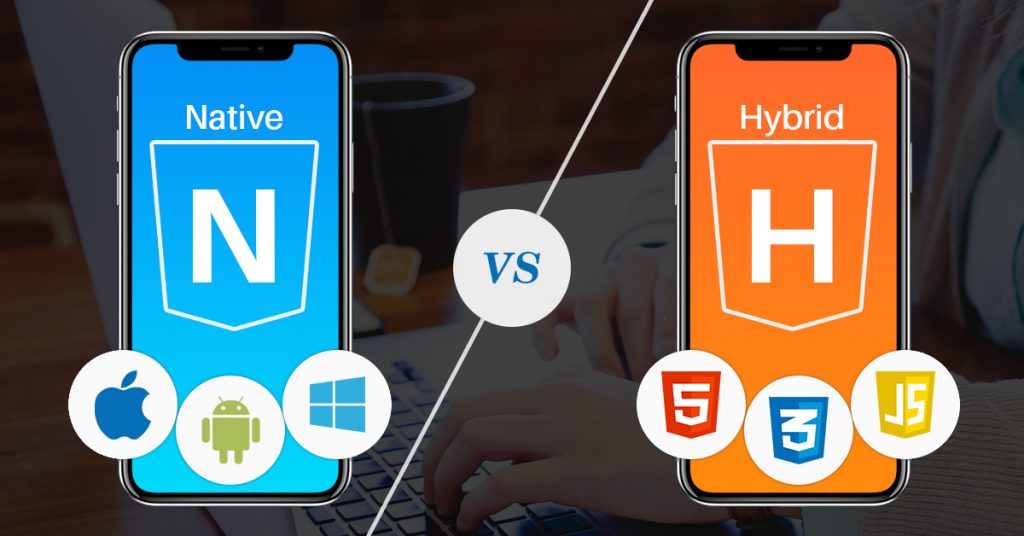
Costing for long is said to be a critical factor in mobile app development. This has long been presumed as a great denominator that defines the budget allocation of any company. Sometimes it appears like ‘digging the earth’. The deeper you dig, the more things you get. But it is the cost of execution that becomes a deciding factor in making a selection. Similarly, world-across mobile app developers are making penetration into the market with distinct tech innovations to bemuse the whole world.
For an IT company developing a mobile app is like manufacturing & designing a different shoe with the same leather. Apart from costing they find themselves in a dicey situation which one they look for —hybrid or native app?
So are you falling in the same category? Today we’ll discuss a key point that differentiates between –Hybrid vs Native Mobile App.
Hybrid Apps are those apps that are manipulated using the latest arrivals in the market with the existing ones. A blend of both the new and the older ones. It has essential factors like cost & efficiency which helps in managing the app. For extensive reasons, mobile app development is critical when it comes to app development. It possesses the same element as native apps.
Major Advantages of Hybrid Apps
Reducing Development Time & Cost
Plays a critical role which substantially reduces development time & cost in comparison to other apps as it reduces the need for iOS or Android app.
Reusing the code of the web app art
As this is written once this substantially reduces considerable time & money compared to native apps which reduces the time & cost in comparison to other apps. This is written once and deployed on a variety of platforms.
Native apps run on a specific device and operating system in their original form. For companies, mobile app development cost is a key factor. Building a native app allows you to leverage device-specific hardware and software features.
Advantages of Native Apps
- You can have rich experience with native apps as it is interactive, ingenious, intuitive, that run smoothly in terms of producing input or output
- Native development allows developers to access the full feature set of the operating system
- Native apps are often known for their time-bound delivery performance compared to hybrid applications.
- The user experience of native apps is far more satisfying than hybrid apps. As they don’t have to bear with two different app development. To the user, the flow is more natural because each mobile operating systems follow specific UI guidelines & standards
- It is the operative system of the device which approves the respective system that guarantees efficacy.
- A native app should work in correlation with the respective operating system which assures quality, security, and device compatibility.
Disadvantages of Native App
- Native apps use complex programming languages that ask for experienced developers.
- Developing native apps costs more upfront than developing hybrid apps.
- Native apps are not always the best choice for the simplest of applications.
Advantages of Hybrid App Development
- Hybrid apps often don’t need a web browser like platform
- These apps have access to a device’s internal APIs and hardware device
- This requires only the codebase which is needed for hybrid apps.
Disadvantages of Hybrid App Development
Users often complain about the speed issue with Hybrid apps as it is slower than the native apps. With hybrid app development, you’re dependent on a third-party platform to deploy the app’s wrapper.
Hybrid apps are often slower than native apps due to third-party platforms and limited customization. Native apps, built specifically for iOS (Swift/Objective-C) or Android (Java), follow OS guidelines, offering smoother performance and a better user experience.
On the other hand, app applications are, at their core, websites packaged into a native wrapper.
Even though there are several factors that impact the cost of the app — the technology that the app is based on makes the most impact as it decides
- Platform
- Back-end services
- Type of app development firm
- Post Development Costs
Let’s take a look at the development costs for both, native and hybrid apps along with their advantages and disadvantages.
While going through this piece Which is an economic — Hybrid or Native App?
When it comes to implementation both hybrid and native app development ask for the same energy & efforts. Using hybrid app development, you learn to manage the issues that perhaps occur because of hybrid or native app.
Effort and Challenges in Hybrid App Development
It requires the same amount of effort which makes this a favorable choice. With hybrid app development, you may have to tackle new challenges like issues that occurred with the stem from both native systems and hybrid systems. Sometimes, working between the two systems makes fixing bugs a difficult task.
Dependency on Third-Party Tools
The disadvantage of having to work with a third-party hybrid wrapper is the dependency on a cross-platform development tool such as Xamarin or Cordova. Every time the UI kit releases new features, you need the right set of tools for having impeccable app development. When you develop a hybrid app, there’s an added layer that you don’t have control which may increase the bugs.
Bug Management and Development Costs
Bugs are a natural challenge in hybrid app development. When new features release for a specific operating system, these bugs can increase development costs and delay timelines.









